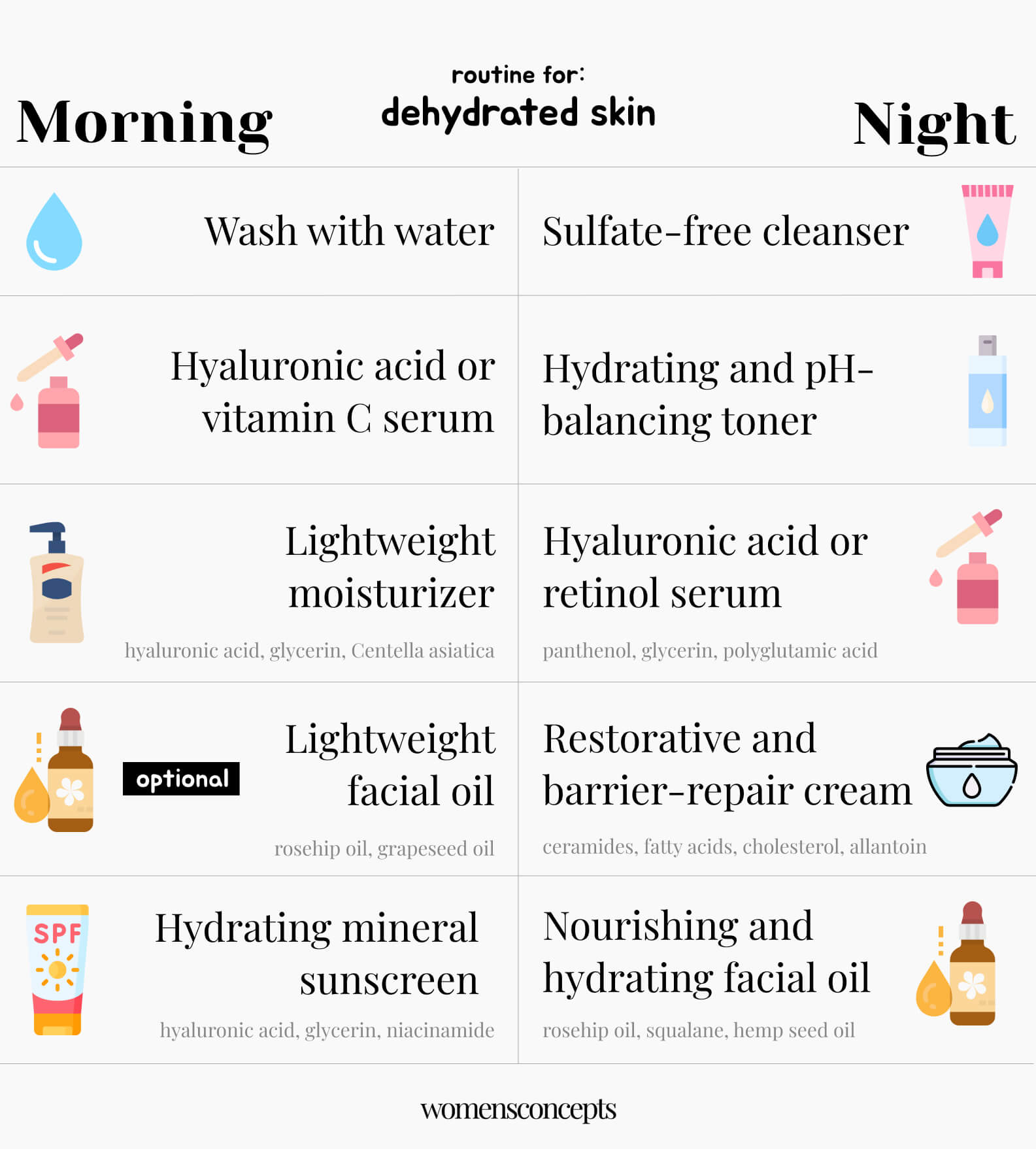Skin feeling more sensitive, more frequent breakouts, and an overall dull and lackluster complexion—meet dehydrated skin. Everyone’s skin is susceptible to dehydration at any point (yes, even oily complexions), but the good news is that, unlike dry skin, a dehydrated face can be quickly restored. So, if you just caught a glimpse of the telltale signs of dehydrated skin, our guide is your ticket to reclaiming that much-needed moisture and bringing your skin back to life.
- Start with a gentle cleanser
- Consider using a pH-balancing toner
- Add a hydrating serum to your routine
- Seal the hydration with a moisturizer
- Apply a facial oil
- Never skip sunscreen
- Exfoliate once weekly
- Treat yourself with a hydrating mask
- Restore the skin's moisture barrier
- Get to slugging
- Eat healthily and hydrate sufficiently
- Consider a humidifier
- Avoid long hot baths
- Consider collagen supplements
Dehydrated skin vs. dry skin
Dehydrated skin is characterized by a lack of water in the skin and is largely the result of a compromised lipid barrier. Unlike dry skin, which is an inherited type of skin that naturally produces less oil, dehydrated skin is a temporary condition that can happen to anyone. Harsh cleansers and scrubs, sun damage, cold weather, and stress are all factors that can dehydrate your skin and impair the moisture barrier.
Signs of dehydrated skin
Chances are you’re dealing with dehydrated skin if you experience dullness, reduced elasticity, increased sensitivity, and a loss of your once-radiant glow. A general sense of discomfort, prominent dark circles, and breakouts are also common signs of dehydrated skin. On the other hand, you know you’re grappling with a dry complexion if you have a rough texture, a tight feeling, and experience occasional itching and flakiness. At the end of the day, both dry and dehydrated skin can benefit from adequate hydration.
What causes dehydrated skin?
Low humidity, hot showers, insufficient water intake, harsh skincare products, lack of sleep, stress, and air conditioning can all cause dehydrated skin. Since a weakened protective barrier drives the skin to lose water at an accelerated rate, maintaining your barrier integer should be top of mind.[1]
Beware the changing seasons, as both cold and hot weather can wreak havoc on your skin’s hydration. During winter, the cold, dry air and indoor heating systems strip away moisture, while in the summer, the scorching heat and sun exposure can induce dehydration through excessive sweating. That’s why it’s crucial to prioritize hydration and adjust your skincare routine accordingly to keep your skin healthy and moisturized throughout the changing seasons.
How to treat dehydrated skin?
To kick things off, ditch drying ingredients that can strip your skin of moisture. These include drying alcohols like benzyl alcohol, SD alcohol, and denatured alcohol, as well as synthetic fragrances, harsh exfoliants, and sulfates—foaming agents like SLS or SLES.
You also need to be mindful of acne-fighting ingredients such as benzoyl peroxide, salicylic acid, and sulfur. While effective in combating acne, these ingredients can potentially dehydrate your skin. If you must use them, follow a well-rounder routine with hydrating and moisturizing products to maintain a healthy moisture barrier.

Thirsty skin SOS: The best skincare routine for dehydrated skin
Building a skincare routine to combat dehydrated skin comes down to using the right ingredients and applying them in the correct order to ensure that your skin receives maximum hydration.
Most people turn to humectants like hyaluronic acid to solve the problem, but they’re only half of the solution. The truth is, when combating dehydrated skin, you should prioritize both humectants and occlusives.
Humectants draw water from the air into the skin, and occlusives form a protective film over the skin to prevent moisture from evaporating. Not using occlusives can actually ruin all the hard work the humectants have done for your skin. One common scenario when humectants inadvertently exacerbate dryness is in dry climates (with air humidity <70%) or winter months. In these weather conditions, they tend to pull water from the deeper layers, which dehydrates the skin from the inside out. That’s why you must use occlusives on top, to seal the moisture.
Glycerin, hyaluronic acid, lactic acid, panthenol, sodium PCA, honey, and aloe vera are some of the best humectants, while occlusive include fatty acids, squalane, beeswax, petrolatum, oils, and shea butter.[2]
Here’s how to create a routine with each and one of these ingredients:
Start with a gentle cleanser
When your skin is dehydrated, you want to use a cleanser that’s as gentle as possible. Overall, you need a product that cleanses effectively but doesn’t strip away moisture or mess with your skin’s natural pH balance—both can dehydrate your skin even more. So steer clear of formulas with SLSs, drying alcohol, and synthetic fragrances. These ingredients can be harsh and drying, and we want to avoid that.
Instead, look for simple formulas with as few ingredients as possible, preferably with a creamy or gel-like texture. We recommend the CeraVe Hydrating Cleanser and La Roche-Posay Toleriane Gentle Cleanser for their gentle yet effective cleansing abilities, as they both utilize humectants and ceramides to provide nourishment.
Moreover, it’s best to give your skin a break from cleanser in the morning, especially if you always wake up with a tight and dry complexion. There’s not much to wash off in the morning anyway, and water will do just fine. By skipping the morning cleanse, you preserve your skin oils that build overnight and so your skin will become more naturally hydrated.
Consider using a pH-balancing toner
Although optional, using a toner can help restore your skin’s natural pH balance and create an even smoother canvas for the rest of your routine.
After cleansing, dip a cotton pad in a gentle toner and dab it all over the face. Two options worth considering are First Aid Beauty Ultra Repair Wild Oat Hydrating Toner and Paula’s Choice Skin Recovery Calming Toner—they are both gentle and address dry skin with hydrating ingredients.
Add a hydrating serum to your routine
With dehydration putting skin to the test, what better way to add more moisture if not using a hydrating serum? Hyaluronic acid is what we recommend; no ifs or buts about it.
Incorporating a hydrating serum with this moisture magnet can provide a boost of hydration and help replenish the skin’s moisture reservoirs. You can check our top selection of hyaluronic acid-infused serums here. Serums that contain vitamin C, panthenol, glycerin, Centella asiatica, and other humectants are also great for giving skin its bounce back.
Seal the hydration with a moisturizer
After applying your serum, top it with a moisturizer, preferably with occlusives. This step is very important as it acts as a barrier that locks in the moisture pulled by the serum into your skin.
Pick a lighter moisturizer for the day and a heavier cream with additional reparative ingredients (like ceramides) during the night.
If you’re applying sunscreen during the day (like you should be doing), you don’t necessarily need to use a separate moisturizer. Ideally, use a physical sunscreen because both zinc oxide and titanium dioxide form a protective layer on the skin and block moisture from escaping.
Apply a facial oil
Your dehydrated skin can benefit from the emollient benefits of a facial oil like rosehip, grapeseed, squalene, or hemp seed. These are lightweight, can be used both in the morning and night, and work great to provide the perfect amount of lightweight hydration and lock in moisture. Use them after serum and moisturizer and before sunscreen. Make sure to wait a few minutes for the oil to dry out before applying sunscreen.
Never skip sunscreen
Sunscreen is non-negotiable, 365 days a year. You shouldn’t skip it no matter what. Sun damage is a major culprit behind dehydrated skin and aging signs, so make it a habit to finish your morning routine with sunscreen with at least SPF 30.[3] Our top pick is Supergoop Mineral Sunscreen as it’s powered by sun protective minerals and moisturizing ingredients. It not only boosts skin’s UV protection but also provides intense hydration. Similarly, Neutrogena Sheer Sunscreen with Broad Spectrum SPF 50 stands out as a more affordable option.
Exfoliate once weekly
Even if your skin is dehydrated, you need to exfoliate it regularly. When dead cells build up, it can hinder the penetration of skincare products and leave your skin looking dull and rough.
While all alpha-hydroxy acids have humectant properties and attract water into the skin cells, lactic acid is known for its gentleness.
That being said, once (or twice) a week, exfoliate your skin with a lactic acid peel before your nighttime skincare routine. Think of it as a prelude to enhancing the effectiveness of your serums and moisturizers. The Ordinary Lactic Acid 5% + HA 2% is a great choice for dry-skinned people as it provides gentle exfoliation with hydrating properties.
Treat yourself with a hydrating mask
Two to three times a week, use a hydrating mask to help restore your dehydrated skin. You can whip up a homemade mask with honey, oatmeal, and olive oil or a ready-made one (like Laneige Water Sleeping Mask or Bliss Mighty Marshmallow Whipped Mask).
Restore the skin’s moisture barrier
A weak lipid barrier is the main cause that causes the skin to lose water and become dehydrated. Thus, the key to fixing dehydrated skin lies in restoring this barrier. Essentially you need to apply a cream that contains the lipids naturally found in the skin barrier—ceramides, fatty acids, and cholesterol. Do it every night as the last step of your routine. We recommend these barrier repair creams.
Get to slugging
This trend is a godsend for dehydrated skin. For the uninitiated, slugging is a technique that involves applying a thick layer of a heavy occlusive like petroleum jelly on your face as the last step of your nighttime routine. This creates a protective film on the skin’s surface that reduces moisture loss and locks in the moisturizing products you’ve previously applied so they can provide hydration for longer. Just don’t o slugging after products with retinol or AHA/BHA, as it will increase the chances of irritation.
Summary
Morning:
- Skip the cleanser and use water to wash your face. Optionally, use face mist or thermal water to refresh your skin in the morning
- Apply a hyaluronic acid or vitamin C serum
- Follow up with a lightweight moisturizer
- Finish with a hydrating mineral sunscreen
Night:
- Start by cleansing your face with a gentle, sulfate-free cleanser
- Follow up with a hydrating and pH-balancing toner
- Apply hyaluronic acid serum
- Use a facial oil to lock in moisture
- Finish with a rich night cream with occlusives and emollients
Lifestyle changes to fix dehydrated skin
Certain lifestyle factors can reduce or improve skin hydration:
Eat healthily and hydrate sufficiently
Fuel your body with a healthy and balanced diet of water-rich foods, like avocados, cucumbers, watermelon, and oranges, and ones rich in fatty acids. And always stay hydrated by drinking plenty of water. The general rule is to drink about six to eight glasses of water daily.
Consider a humidifier
While a humidifier isn’t a must-have for hydrated skin, it can be helpful in creating a more favorable environment that supports moisture. Humidifiers help improve the air humidity levels in your home and provide your skin with an ample supply of water molecules to stay hydrated. Consider them a necessity in winter, when the heating tools tend to dry out the air and contribute to skin dehydration.
Avoid long hot baths
Hot water can be harsh on the skin, so limit long, hot baths as much as possible. Instead, take shorter, hot showers for about 5-10 minutes. By doing this, your skin can better retain its natural moisture.
Consider collagen supplements
A few clinical studies were performed regarding the effects of collagen-based supplements on skin hydration, and the results were promising: collagen supplements improve skin elasticity and moisture retention.[4]
How to prevent dehydrated skin
To prevent dehydrated skin:
- Avoid products with harsh ingredients, like sulfates, alcohol, and fragrances
- Maintain a healthy skin barrier
- Don’t wash with hot water but with lukewarm
- Use a humidifier
- Don’t use the cleanser in the morning
- Drink eight glasses of water per day
- Eat a balanced diet
- Avoid harsh scrubs
- Don’t exaggerate with alcohol and caffeine
- Use sunscreen every day
- Moisturize daily
Read next: 12 Best Products To Quench Your Dehydrated Skin
Sources
- Duplan H, Nocera T. Hydratation cutanée et produits hydratants [Skin hydration and hydrating products]. Ann Dermatol Venereol. 2018 May;145(5):376-384. French. doi: 10.1016/j.annder.2018.03.004. Epub 2018 Apr 25.
- Elisabeth Anderson, Michigan State University, Center for Research on Ingredient Safety, Cosmetics – Exploring humectants, August 26, 2019
- Kao Corporation, Biophoton-associated chronic photodamage of skin, including skin dehydration and surface roughness, 2019/10/11
- Choi FD, Sung CT, Juhasz ML, Mesinkovsk NA. Oral Collagen Supplementation: A Systematic Review of Dermatological Applications. J Drugs Dermatol. 2019 Jan 1,





